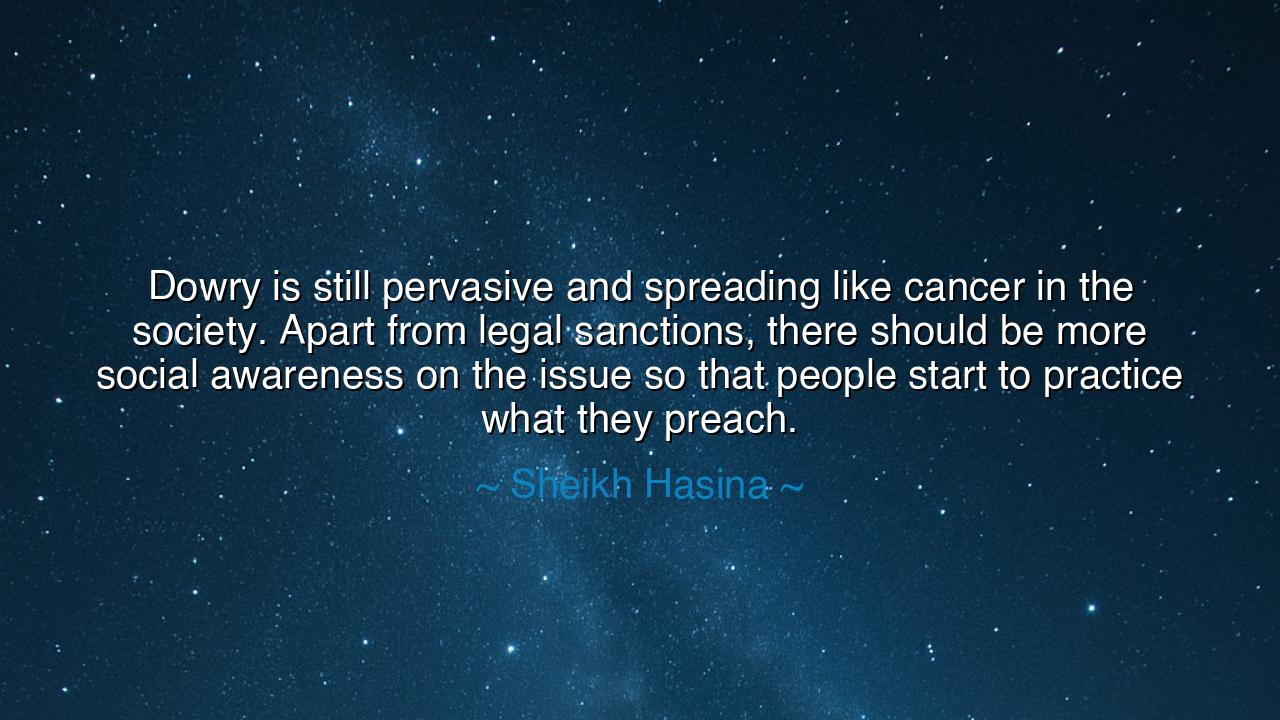
Dowry is still pervasive and spreading like cancer in the
Dowry is still pervasive and spreading like cancer in the society. Apart from legal sanctions, there should be more social awareness on the issue so that people start to practice what they preach.






When Sheikh Hasina declared, “Dowry is still pervasive and spreading like cancer in the society. Apart from legal sanctions, there should be more social awareness on the issue so that people start to practice what they preach,” she spoke with the voice of one who has seen the deep wounds of her nation — wounds inflicted not by war or famine, but by customs that enslave the spirit. Her words are not merely political; they are prophetic. For she names an enemy more insidious than poverty: the dowry system, which corrupts love, demeans women, and stains the soul of society with quiet cruelty. In calling it a “cancer,” Hasina reveals both its pervasiveness and its destructive power — a disease that feeds on greed, hypocrisy, and silence.
The origin of this quote lies in Hasina’s long struggle as a leader and reformer in Bangladesh, a nation where tradition and progress often clash. Having risen from a history marked by struggle — the daughter of Sheikh Mujibur Rahman, the Father of the Nation — she inherited not only political responsibility but a moral mission: to uplift her people, especially women. The dowry system, though outlawed by law, continued to flourish in villages and cities alike. It had become a contradiction of conscience — illegal in words but accepted in practice. Hasina’s statement, therefore, is both an accusation and a plea: a call to awaken the nation’s conscience, to align the law of the state with the law of the heart.
Her words remind us that laws alone cannot heal a moral sickness. A society may ban an evil on paper, yet still nurture it in spirit. The dowry system is proof of this. Though cloaked in the guise of tradition, it has destroyed countless lives. Many women — young brides — have been beaten, humiliated, or driven to despair because their families could not satisfy demands for money or gifts. The evil persists because it wears a familiar face; because it hides behind celebration, behind marriage, behind what should be sacred. Sheikh Hasina’s insight is that true reform begins not with punishment, but with enlightenment — that hearts must be educated as well as laws enforced. Only when people believe that dowry is shameful, not just unlawful, will the chains of custom be broken.
History offers a mirror to this truth. In ancient India, reformers like Raja Ram Mohan Roy and later Ishwar Chandra Vidyasagar fought against similar evils — sati, child marriage, and caste oppression. They understood that moral battles are not won by decree alone; they are won when conscience rises above comfort. Roy did not merely campaign for laws; he wrote, preached, and stirred the minds of his people until they could see the inhumanity of their own customs. Sheikh Hasina walks in that same lineage — urging her people not only to legislate righteousness but to live it. For as she says, society must “practice what it preaches” — it must embody the ideals it proclaims.
The metaphor of cancer that Hasina uses is deliberate and devastating. A cancer does not strike at once; it grows quietly, cell by cell, feeding on neglect. So too does dowry thrive in silence — in the whispered acceptance of “this is how things are.” Families that claim to be modern still demand it under different names; communities that honor women still barter them like property. The disease grows not from wickedness alone, but from cowardice — from the fear of standing against custom, from the convenience of conformity. And so Hasina’s remedy is not only law, but awareness, courage, and moral clarity. To cure such a disease, she implies, one must purify both the body and the soul of society.
There is something deeply heroic in her stance. For to speak against dowry in regions where it is woven into culture is to confront centuries of entrenched belief. It is to challenge fathers, brothers, priests, and even mothers who perpetuate it unknowingly. Hasina’s call for “social awareness” is, in truth, a call for moral rebellion — for every man and woman to reject greed in the name of love, and to honor daughters not as burdens, but as blessings. Like every true leader, she demands not blind obedience to law, but awakening of conscience — the higher law written in the human heart.
Let this, then, be the lesson that endures: that evil sustained by custom is harder to destroy than evil imposed by tyranny. It hides in the folds of habit, in the comfort of acceptance, in the silence of the majority. But just as a single flame dispels darkness, a single act of courage can expose hypocrisy. The fight against dowry — and all systems of exploitation — must begin in every home, every heart, and every conversation. Social awareness is not a slogan; it is a daily act of integrity.
And so, from Sheikh Hasina’s words, let future generations learn this truth: that justice without compassion is incomplete, and law without moral conviction is hollow. When people live as they preach — when love replaces greed and dignity replaces dowry — then the cancer will die, not by the surgeon’s knife of the law, but by the healing strength of a renewed conscience. For the true triumph of civilization is not in its progress, but in its purity — when it can say with honesty: We have learned to value a human being above all price.






AAdministratorAdministrator
Welcome, honored guests. Please leave a comment, we will respond soon